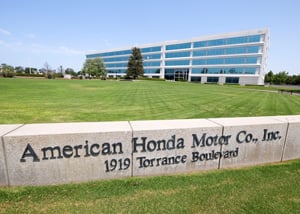
American Honda Motor Co. Inc. is the new leader on the Business Journal’s annual list of foreign headquarters in Los Angeles County (see page 12), thanks to the almost completed relocation of longtime No. 1 Toyota Motor Sales USA’s headquarters to Plano, Texas.
And Toyota, with its $252 billion in global revenue last year, is not the only departure looming. No. 2 Nestle USA Inc., with its $91 billion in global revenue in 2016, announced last summer that it is relocating its U.S. headquarters from Glendale to Arlington, Va. Nestle remains on this year’s list only because its move won’t be completed until next year.
Those moves mean American Honda’s U.S. headquarters in Torrance will soon be far and away the biggest foreign-owned company with its U.S. headquarters in the county. The automobile maker has nearly $125 billion in global revenue, six times the revenue of No. 3 KT America, a South Korea-based telecom services provider, and No. 4 Kirin Brewery of America, which each posted $19.1 billion in 2016.
American Honda is now one of only two foreign auto makers on the list – the other is Chinese electric-car maker BYD Ltd. Corp., in the No. 7 slot with $15 billion in global revenue. Nissan Motor Corp. never made the cut, since the company moved its North American headquarters from Gardena to Nashville, Tenn., in 2005, before the Business Journal’s first list of foreign company U.S. headquarters in the county.
Toyota and Nissan said they chose to move their headquarters outside of the county to be closer to the bulk of their manufacturing operations and more centrally located for their overall consumer market. Other factors, according to reports at the time the moves were announced, were California’s relatively high personal income tax rate and the region’s high housing costs.
Stephen Cheung, president of the World Trade Center Association of Los Angeles, said some churn of foreign company U.S. headquarters is the norm in any case.
“We expect to continue to see ebbs and flows of companies – domestic and international – to come in and out of the region in the future,” he said.
So far, though, American Honda has opted to remain in the county the company has called its U.S. home for nearly 60 years.
“Since American Honda first established its operations in Los Angeles County in 1959, we have grown our sales, marketing and R&D operations in this community, even as we have expanded our manufacturing presence throughout North America,” spokeswoman Jaymie Robinson said in an email. “Southern California is a great market for Honda products, offers a diverse and talented workforce, and is an excellent place to work and live.”
Asian magnet
The county remains a key U.S. home base for Asian companies trying to penetrate the American market even with the recent departures of auto brands. Seventeen of the 20 companies on the list hail from east Asia, including nine from Japan, three from China and two from Korea.
“The fact that they have selected L.A. as their home speaks volumes,” the trade association’s Cheung said. “This does not go unnoticed by firms and companies from their home countries.”
It’s no surprise that nine of the 20 companies on the list are from Japan. The island nation tops the list of country of origin of foreign-owned enterprises in the county as ranked by jobs in 2016, according to a just-released study from the Los Angeles County Economic Development Corp. and the trade association. Japan-based firms had 87,000 jobs here – nearly 20 percent of the total jobs at foreign-owned companies – generating $5.5 billion in total wages.
Another prominent feature of this year’s list: The five food and beverage companies make up the largest industry cluster.
“People in L.A. are very open to experimentation with food and cuisine
from other countries and cultures,” Cheung said. “This increases the consumer base for many of the food/beverage companies.
Often, these companies locate here for the large and diverse local market, build a local following, and once they have a foothold in the market they expand to the rest of the nation and beyond.”
One other factor influencing this year’s list has to do with reported global revenue, which dropped or remained flat at several companies. In the case of Japanese companies – such as digital imaging giant Epson America Inc. or ball bearing manufacturer NMB USA Inc. – that might be due in large part to the strong Japanese yen, which lowers the conversion into U.S. dollars.
